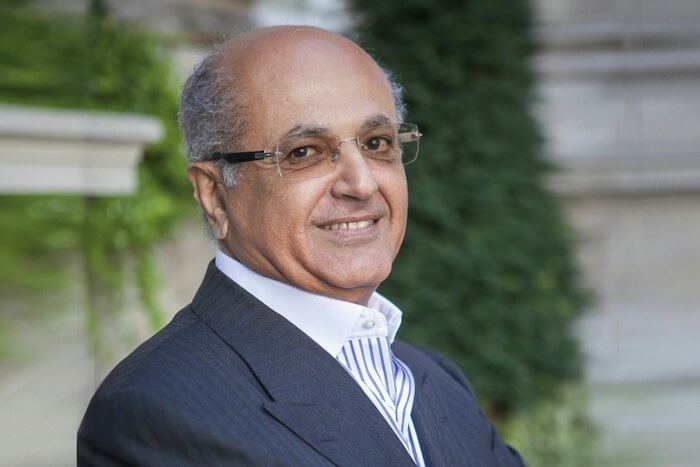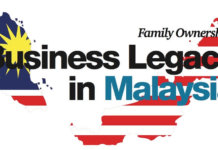Yemen-based shaher trading Company limited (stCO) was founded in the mid-1970’s, the family’s commodity trading activities extended to, among others, petroleum products. stCO grew to become a major long-term contract supplier in the region. the group today employs over 10,000 employees in the Middle east and is one of the largest business groups in the MenA region. the core commercial activities of stCO are in oil and minerals, beverages and packaging, and various strategic investments. the Abdulhak family business is in its fourth generation. Of more than 100 family members of the Abdulhak family, around 15 are actively supporting business operations. while the company is still 100% percent family-owned, non-family executives manage the subsidiaries. The Abdulhaks are currently strengthening their family-based ownership structure by implementing a shareholder agreement and family constitution.
Abdulgalil A. Besher, Managing Director of MAC Investments, joined the family business over 35 years ago. educated as an architect, he began his role at stCO supervising supplier relationships. Abdulgalil soon was put in charge of the hospitality and beverages activities in egypt and Yemen. today, he is one of the Abdulhak family’s strongest advocates for the induction of ownership structuring and governance tools. Tharawat magazine spoke to him about family ownership, the next generation, and navigating the duality that exists between his role as both owner and manager.
What do you think are the challenges and advantages of family ownership?
There are advantages and disadvantages; the success of it depends very much on the governance system the family has in place. When a family business is small it is not that big of a problem but when you start becoming bigger, then a formal governance system becomes essential. A formal structure has to be part of a family business. A small family business run by an entrepreneur is of great advantage in the decision-making process.
As the number of shareholders and stakeholders changes, running the business starts to become more complex and a formal structure becomes mandatory. You have to enforce discipline too. Especially if you own several subsidiaries you have to implement regular meetings. Discipline is the most important thing and it has to start at the top if you want all your subsidiaries to take over the same culture and values.
Does being a family make these things easier or more difficult?
It is more difficult if you do not implement proper corporate governance; it is harder to change habits in a family because of the emotional ties that tend to come into the way. If you want to transfer your business to the next generation you have to have these structures in place. The complexity added to the business with every family generation demands it.
A family member is born into the role of shareholder. What is the responsibility of non-active family members in the business?
A family’s priorities are not only focused around the business; a family is still a family and has a lot of other obligations in society beyond its professional performance. This is why tools such as a family council are important. In Yemen, where we come from, we interact with society every day and you have to include family members who run other businesses and have other interests. This contributes a lot to the family reputation. Every family member is quite different but they all always carry the name, and this can be an added benefit.
How have you harmonised the roles of manager and owner?
In a family business it is expected from the manager/owner to make decisions without going through formal processes. When you’re sitting in a meeting you’re at a disadvantage, but at the same time at an advantage; if you want you are able to make a decision right away, but you have to be disciplined enough not to make that decision on impulse.

For the young generation members who are direct or indirect shareholders, depending on their ages, it is actually difficult to be employees in the company. Naturally, they have the attitude of an owner to begin with. They grow up with the business but also with the pressure of doing much better than the average employee. Whether young family members can manage these challenges depends greatly on how they are raised. What values you transfer within the family determines what kind of owners and managers the young family members become.
Do you allow the younger generation to shadow you in your day-to-day business activities?
I try to involve them as much as possible. I invite them to meetings just so they can witness how board meetings are run, how management meetings are held and also factory visits and other parts of my daily activities; that sort of thing engages them and I do it as early on in their careers as possible. We also have created a forum through which they are briefed on the company’s performance. This brings them together and adds to their feeling of belonging.
Which additional tools do you think will aid family businesses in remedying possible disadvantages of family ownership?
Primarily every company should have its governance in place. No decision should be made outside of the mandates defined by the family. Moreover, within the company, I think the communication channels have to be open. My door is always open for all employees to be able to come and see me. A family business should have that culture that allows that kind of direct interaction. Hierarchy should be maintained of course. I would, for example, never go over the head of my COO or GM and start interfering in their decision-making, that’s disruptive. Do not place family members in a job they are not qualified for, just because they are family.
Do you think that family ownership is a business model that should be encouraged?
Without any doubt. However, we have to be honest and admit that while it gives you a lot, it also demands a lot from you. Fulfilling family expectations is hard. Being in a family business means being more than just an employee. There are no holidays and it is a full-time job, professionally and emotionally. But the benefits clearly outweigh the disadvantages.
Tharawat Magazine, Issue 16, 2012
















